2024年7月3日至5日,国际技术增强语言学习与教学及语料库语言学习与教学会议(TeLLT & CoLLT 2024)在香港教育大学成功举办。此次会议旨在汇集全球学者,共同探讨技术赋能语言学习与教学(TeLLT)及语料库语言学习与教学(CoLLT)的最新研究成果。
From July 3 to 5, 2024, the International Conference on Technology-Enhanced Language Learning and Teaching & Corpus-Based Language Learning and Teaching (TeLLT & CoLLT 2024) was successfully held at the Education University of Hong Kong. The conference aimed to bring together scholars worldwide to discuss the latest research in technology-enhanced language learning and teaching (TeLLT) and corpus-based language learning and teaching (CoLLT).
在本次会议中,CLEAR研究中心的四位青年学者通过专题研讨会的形式报告了四项验证岛脊曲线理论(Island Ridge Curve, IRC)的实证研究,她们分别为杨茵博士(香港教育大学讲师),杨妍同学(新西兰奥塔哥大学博士生),葛倩文同学(上海外国语大学博士生),和省可可同学(上海对外经贸大学硕士研究生)。本次专题研讨会的四个报告展示了如何将岛脊曲线作为理论框架应用于技术赋能语言学习的研究领域。
Four CLEAR-affiliated young scholars attended this conference and presented four studies in a symposium. They are Dr. Yin Nicole Yang (Lecturer from the Education University of Hong Kong), Ms. Yan Yang (PhD candidate from the University of Otago), Ms. Qianwen Ge (PhD candidate from Shanghai International Studies University), and Ms. Keke Xing (master’s student from Shanghai University of International Business and Economics). The symposium showcased how the Island Ridge Curve (IRC) theory can be applied as a theoretical framework in technology-enabled language learning.
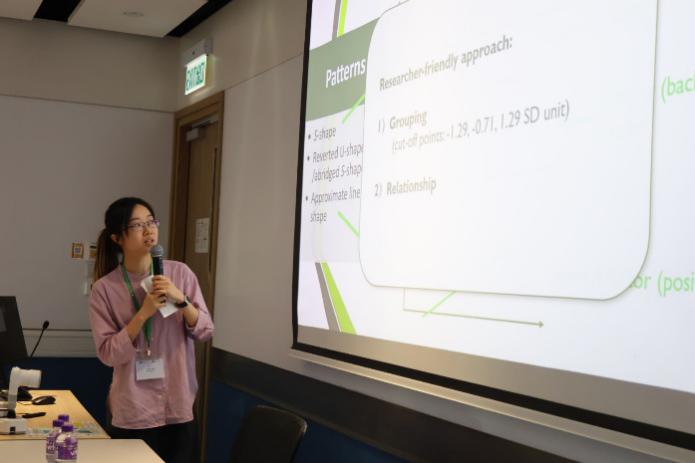
专题研讨会由杨妍同学主持。一开场,主持人先介绍岛脊曲线理论的内容,包括涉及到的变量分类、变量对语言学习的影响的变化模式、以及这些变化模式背后的哲学规律。随后,杨妍同学进行了第一项研究汇报,关于自我导向学习与ICT使用在预测英语阅读成绩的相互作用。研究发现,自我导向学习能够作为中介变量实现ICT使用对阅读成绩的间接正向作用,但此显著作用只在中等水平的学习者群体出现,印证了岛脊曲线理论的假设。
Ms. Yan Yang chaired the symposium. The session began with an introduction to the Island Ridge Curve theory, covering IRC’s categorization of variables, patterns of effect on language achievement, and the philosophical interpretations underlying these patterns. Following this, Yang Yan presented the first study on the interaction between self-directed learning and ICT use in predicting English reading achievement. The study found that self-directed learning mediated the positive effect of ICT use on reading achievement. Still, this significant mediating effect only appeared among learners with proficiency at the middle level.
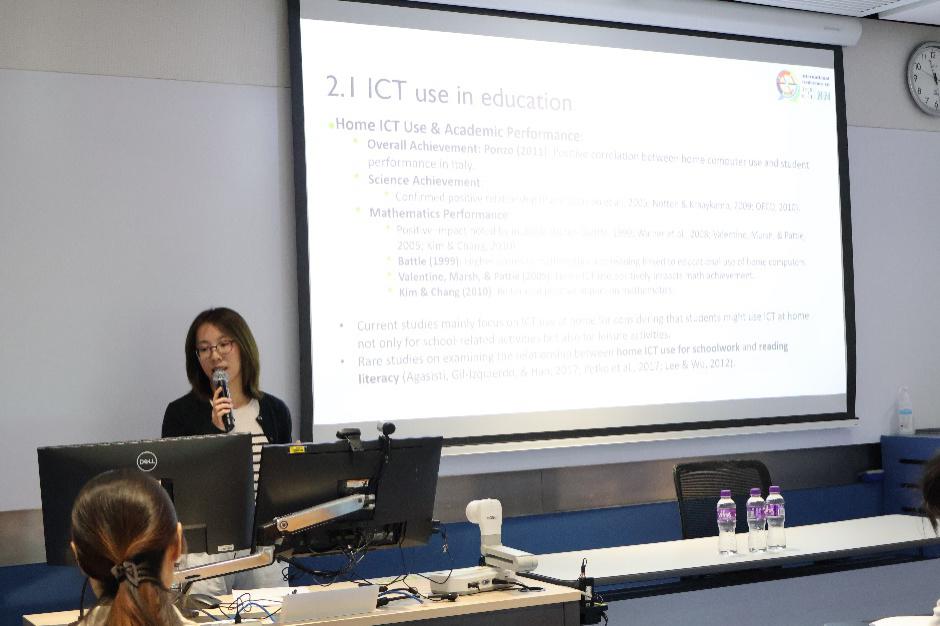
第二位报告人杨茵博士的研究主题是结合个人中心和变量中心的方法研究香港青少年学生的ICT使用模式及其与阅读成就的关系。研究结果显示,不同的ICT使用模式对学生的阅读成绩有不同程度的积极作用,值得关注的是中间水平的学习者群体获得最大效用值,符合岛脊曲线理论所揭示的规律。
The second presenter, Dr. Yin Nicole Yang, discussed the relationship between ICT use patterns and reading achievement among Hong Kong adolescent students using a combination of person-centered and variable-centered approaches. The study found that different patterns of ICT usage had varying positive impacts on students’ reading achievement, with medium-level learners benefiting the most, aligning with the principles revealed by the Island Ridge Curve theory.
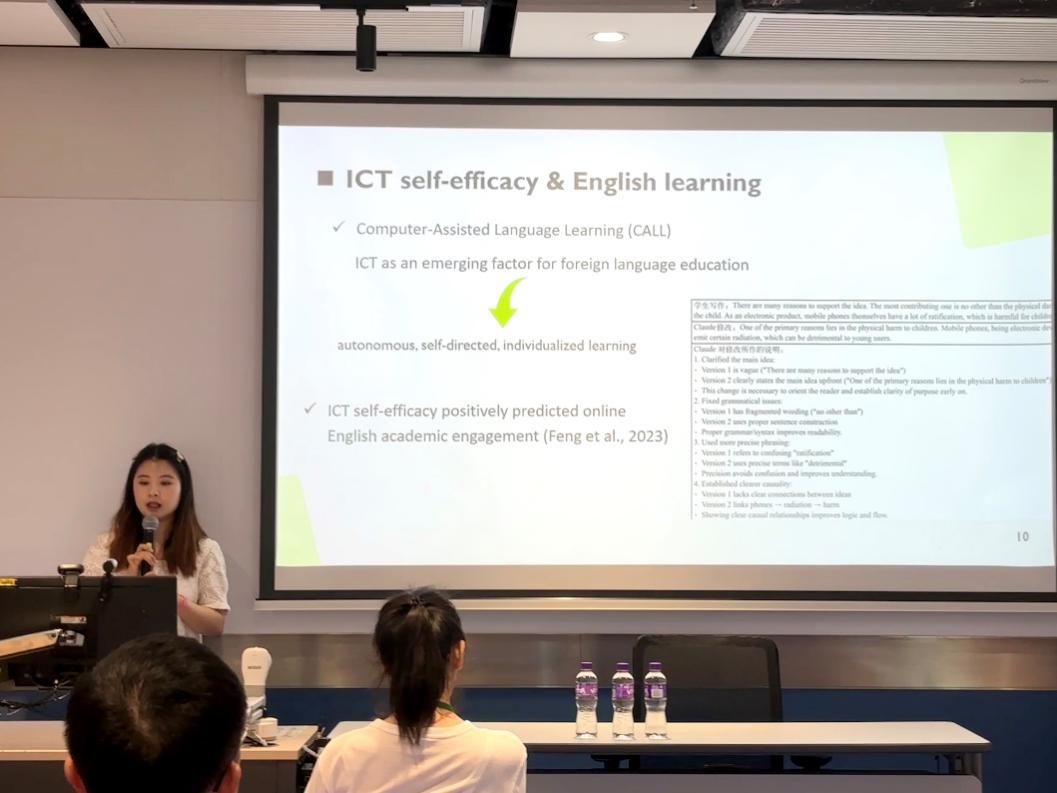
第三位报告人葛倩文同学探讨了从岛脊曲线视角揭示二语学习者ICT自我效能与英语阅读成绩之间的复杂关系。研究表明,基本的ICT自我效能与中等水平学生的英语阅读成绩正相关,却与高水平学生的英语阅读成绩呈负相关;而高级的ICT自我效能则仅对高水平学生的英语阅读成绩有正向预测作用。
The third presenter, Ms. Qianwen Ge, explored the complex relationship between ICT self-efficacy and English reading achievement from the perspective of the Island Ridge Curve. The study revealed that basic ICT self-efficacy was positively correlated with English reading achievement among the medium achievers while negatively associated with English reading achievement among the high achievers. Advanced ICT self-efficacy was found to predict English reading achievement positively only among high achievers.
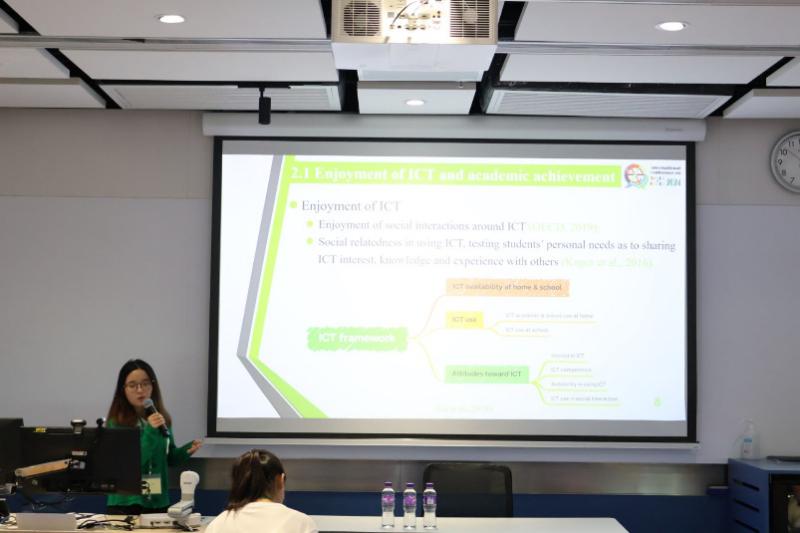
最后一位报告人省可可同学聚焦于ICT愉悦(ICT enjoyment)、在线英语学习投入度(online English engagement)与英语成绩之间的关系。研究结果再次验证岛脊曲线理论的假设:在线英语学习投入度中的行为投入这一维度对ICT愉悦和英语成绩起到显著的中介作用,但是出现在中等水平组中。
The final presenter, Ms. Keke Xing, focused on the relationship between ICT enjoyment, online English engagement, and English achievement. The study found that ICT enjoyment had a direct effect on English achievement. Additionally, for medium-level students, behavioral engagement in online English learning mediated the relationship between ICT enjoyment and English achievement.
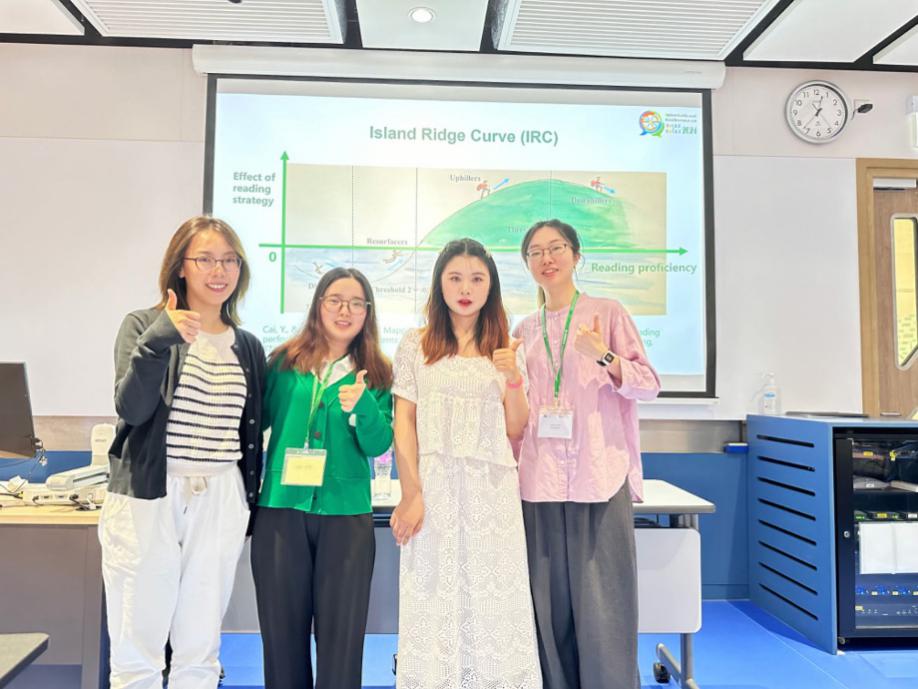
在提问环节中,报告人与听众围绕研究主题的定义、数据处理和分析方法以及岛脊曲线理论的具体内容,进行了深入的讨论。岛脊曲线理论对学习现象的强大解释力激发了与会者们的极大兴趣,纷纷表示希望开展更多的交流学习机会,将岛脊曲线理论引入并应用到各自的研究领域中去。
During the Q&A session, the presenters and the audience discussed the definitions of research topics, data processing and analysis methods, and the specifics of the Island Ridge Curve theory. The solid explanatory power of the Island Ridge Curve theory in understanding learning phenomena sparked great interest among the attendees, many of whom expressed a keen interest in further exchange and learning opportunities to incorporate and apply the IRC theory in their research fields.
Contributed by Yan Yang
